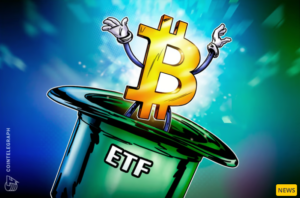In a move widely anticipated, and eagerly awaited, by the industry, the US Securities and Exchange Commission has approved the first US-listed exchange-traded funds (ETFs) to track bitcoin. Many in the sector are calling this a watershed moment for the crypto industry.
Some industry figures have been predicting this move by the SEC for some time. However, the sheer size and influence of the US market, combined with its reputation for being less than welcoming to the crypto-asset market, make this announcement significant. SEC chair Gary Gensler is considered a fierce critic of cryptocurrencies.
The SEC has approved 11 applications, including from BlackRock, Ark Investments/21Shares, Fidelity, Invesco and VanEck. Most of the products are expected to begin trading immediately.
Spectrum Markets, the pan-European trading venue for securities saw a surge in overnight activity on products linked to bitcoin, in the hours following the SEC’s announcement approving the first spot bitcoin ETF.
The volume of bitcoin-linked instruments traded on Spectrum Wednesday was five times higher than the daily average for the preceding three months, with the hours between 22:00 and 23:00 CET accounting for nearly 29% of this activity. Typically trading on bitcoin-linked instruments during these hours accounts for around 8%.
“Investors have waited a long time for this news, and were very quick to respond, taking advantage of our 24-hour trading to react immediately to the SEC’s announcement. We continue to see there are retail investors across Europe that have an appetite for investing in bitcoin, but want to do so within a regulated environment,” says Michael Hall, head of distribution at Spectrum Markets. “In the EU, a Bitcoin ETF is still not possible under existing regulation as UCITS does not allow a single reference price for an ETF underlying. To stay competitive with the US, the EU would benefit from a similar change in rule to avoid European flows being executed abroad.”
Rita Martins, a financial services executive, advisory board member and author agrees this is good news for investors. “Instead of having to think about creating a wallet, memorising 12-word seed phrase and holding their keys, this product scraps all of that and provides a well-known path: buy an ETF. This will open the digital asset space to a broader investor base,” she says. “One of the outstanding challenges in the crypto industry has been the need for more liquidity. The introduction of these ETFs by traditional institutions will inject significant liquidity into the sector.”
Sasha Skoryk, head of banking at Clear Junction, a global payments solutions provider, agrees: “With a decade in the making, these ETFs are poised to reshape the crypto landscape, injecting credibility, accessibility and potentially drawing substantial institutional capital into the market.
“Clear Junction recognises the transformative power of these approved ETFs in giving greater legitimacy to crypto in tandem with regulatory frameworks being adopted worldwide. These developments will give much-needed clarity, reassurance and confidence for institutional and retail investors in crypto as a legitimate and trustworthy instrument. Banks, financial institutions and others that have previously been wary of engaging with crypto can move forward with the knowledge that crypto is now a mainstream investment instrument just like a gold ETF or a Nasdaq-tracker fund.”
In true crypto-drama fashion, industry rumours and even social media hacks have contributed to false information leaking to the press about the SEC’s decision regarding bitcoin ETFs.
On Monday, October 16, 2023 the bitcoin price skyrocketed due to an industry rumour that BlackRock bitcoin ETFs had been approved (they had not, and news reports were swiftly retracted). One week later, on Monday, October 23, bitcoin prices jumped again when the iShares bitcoin ETF was listed on the Depository Trust and Clearing Corporation with the ticker ‘IBTC’. This was later described as a standard process in bringing new ETFs to the market and not a confirmation of approval.
Just this week the SEC’s official account on X (formally known as Twitter) claimed falsely that it had approved US spot bitcoin ETFs. Many in the press speculated that the post appeared to be the result of a hack. The post was shared widely on social media as well as Bloomberg TV and business news websites, until Mr Gensler posted on his own X account 10 minutes later that the regulator’s account had been “compromised” and no approvals had been granted.
“It is important to remember that the opportunities in this space go beyond bitcoin – the trading use case,” says Ms Martins. She adds: “Especially for traditional financial institutions, opportunities and key use cases lie further into the infrastructure, new forms of money (such as stablecoins) and representation of new assets (such as tokenisation). While the bitcoin ETF will legitimise this space and provide a new avenue for joining this space, we need to consider all the other use cases and benefits.”






